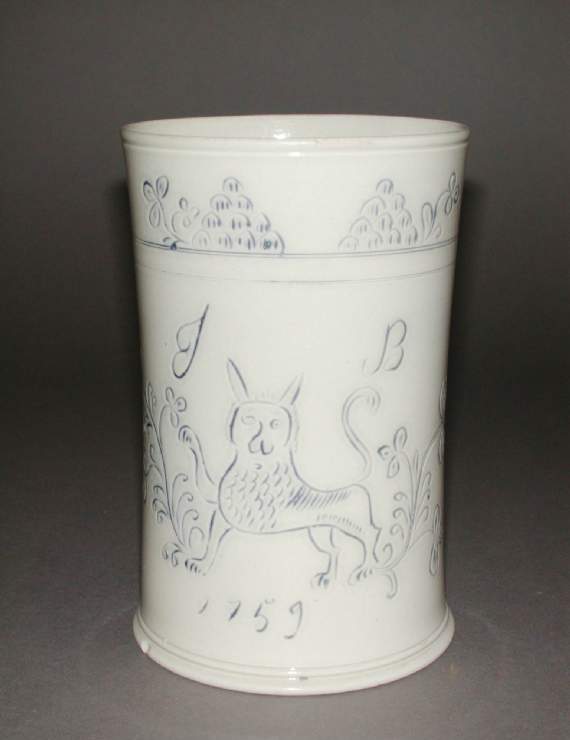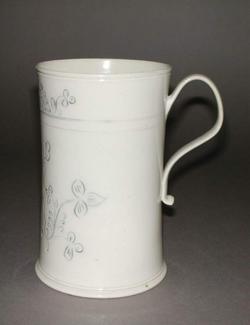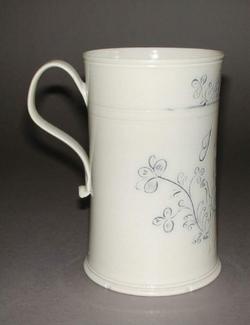Current Location: Gallery 27 (Glaisher)
Maker(s)
Production:
Unidentified Staffordshire Pottery
Entities
Categories
Description
White salt-glazed stoneware with scratch-blue decoration of a lion, foliage, and inscription, 'J B' and '1759'
White stoneware, thrown,with applied handle, and scratch-blue decoration, under salt-glaze. The mug is cylindrical but not quite circular at the top. Its sides slope outwards a little towards the projecting base. The strap handle has an upward kick at the lower end. The front is decorated in scratch-blue technique in greyish-blue with a stylized lion flanked by sprays of foliage. Above are the initials J B (script J) and below, the date '1759'. Above these there are two horizontal bands level with the top of the handle, above which are two triangular mounds of stones (?) with a plant on either side.
Notes
History note: Cecil Baring, 3rd Lord Revelstoke (1864-1934); sold Puttick & Simpson, London 20-23 November 1934, Catalogue of an Important Collection of Old English Pottery. the Property of the Rt. Hon. Lord Revelstoke, lot 311
Legal notes
Purchased with the Glaisher Fund
Measurements and weight
Height: 16.8 cm
Width: 15.2 cm
Acquisition and important dates
Method of acquisition: Bought
(1934-11-20)
by
Puttick & Simpson
Dating
18th Century, third quarter
George II
Production date:
dated
AD 1759
Note
The lion, 'though uncrowned, may refer to the King of Prussia, Britain's ally in the Seven Years' War (1756-62). A mug in the British Museum, (1938,0314.26) is decorated in scratch blue with a crowned lion over the date '1759', and 'Good Success to the king/of Prussia' below a crowned lion. If the initials JB stood for a potter, rather than another person who owned the mug, they might stand for John Baddeley (1725/6-1771) who is known to have made salt-glazed stoneware in the 1750s and 1760s. A salt-glazed stoneware tureen, cover and stand incised ' JB' on the underside of the cover, and 'JB 1763' on the base is in the Victoria & Albert Museum (2169-B-1901). It is more usual to find the potter's initials or name on the base of objects. If the initials referred to the potter, there were several others in the area who had the same initials, such as, James Bold, Joseph Bucknall, and John Brindley, who are known to have been working in the 1760s. .
School or Style
Rococo
Components of the work
Decoration
composed of
cobalt
( greyish-blue)
Surface
composed of
salt-glaze
Base
Diameter 11.1 cm
Body
Materials used in production
white
Stoneware
Inscription or legends present
Inscription present: in script letters
- Text: J B
- Location: On front
- Method of creation: Incised and filled in blue
- Type: Initials
References and bibliographic entries
Identification numbers
Accession number: C.37-1934
Primary reference Number: 74707
Glaisher additions number: Gl.Add.54-1934
Stable URI
Audit data
Created: Saturday 6 August 2011
Updated: Tuesday 30 April 2024
Last processed: Thursday 14 August 2025
Associated departments & institutions
Owner or interested party:
The Fitzwilliam Museum
Associated department:
Applied Arts






